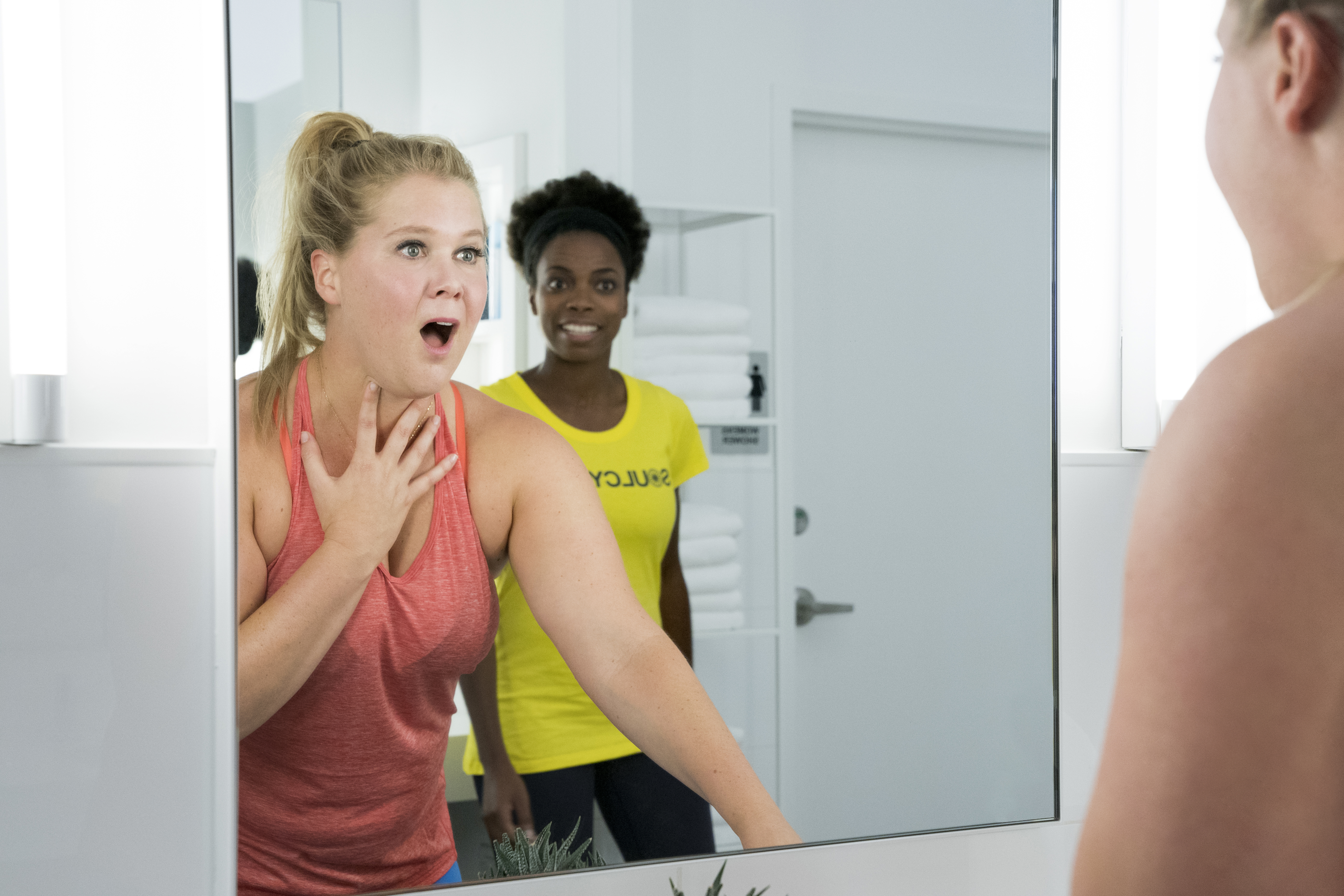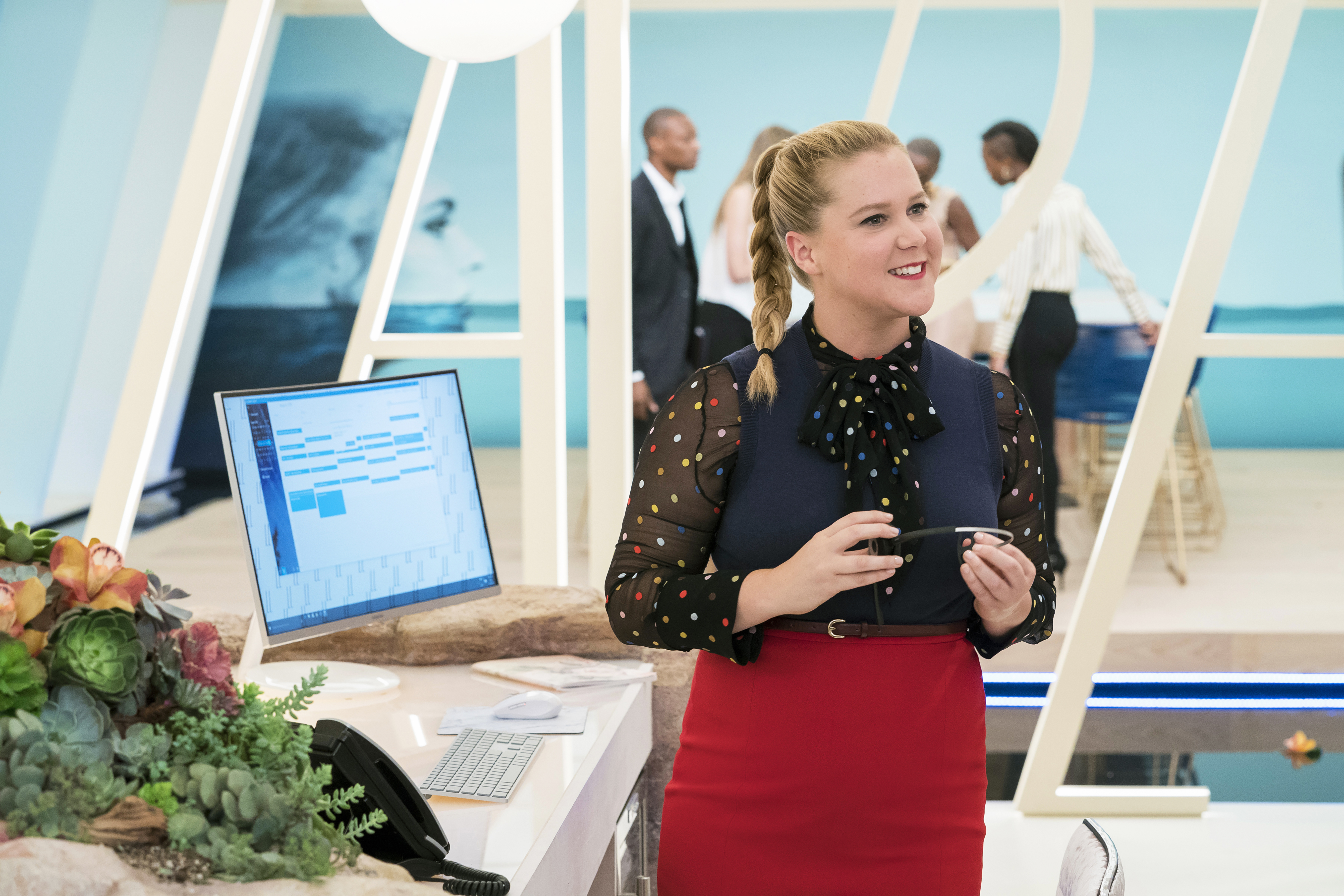A woman who would only be considered overweight by Hollywood/glossy magazine standards feels terrible about her average body. Men pass her over, she works in a basement where her adorable outfits are wasted on a single, antisocial coworker, and she and her friends can’t get a Grouper date. Then, something happens that lets her see herself as beautiful, and this totally good looking woman realizes she can be confident in her own skin. The end!
This may sound familiar because you’ve seen Never Been Kissed or She’s All That, movies that star gorgeous actors like Drew Barrymore and Rachel Leigh Cook as awkward women desperately in need of makeovers. But here it describes the basic plotline of the latest Amy Schumer movie, I Feel Pretty, written and directed by Abby Kohn and Marc Silverstein (who, yes, also wrote Never Been Kissed). Though the story driving this feel-good film sounds played out, it actually made me reexamine my notions about women, beauty, and confidence.
Initial backlash to the movie’s trailer painted its approach to female body image issues as “offensive.” I didn’t want reviews to color my perception, so I didn’t read any in advance and as a result, went into the viewing with a blank slate. By the end, that slate was covered in a positive message.
Spoiler alert (it’s not a mystery or even a drama, you’ll be fine): In I Feel Pretty, Schumer stars as Renee Bennett, who works in the “online division” of a high-end cosmetics company called Lily LeClaire. She works out of a basement in New York City’s Chinatown but dreams of working at the company’s Bryant Park adjacent skyscraper headquarters. She’s unattractive enough that when she goes shopping at Duane Reade towards the beginning of the movie, a man calls her “Sir” and assumes she works there, even though she doesn’t (which is actually a weird commentary on the idea that only unattractive people work at drug stores, but I digress).
Then, one night during a thunderstorm, Renee watches the movie Big, in which an electronic fortuneteller machine grants a boy’s wish of becoming “big” and turns him into an adult Tom Hanks. So Renee gets inspired, makes a wish on a fountain in Central Park, and the next day she goes to Soul Cycle, where she’s by far the largest woman in the class, and hits her head hard after falling off a stationary bike. When she comes to, with a bemused Sasheer Zamata as Soul Cycle employee standing by and offering her a complimentary bandana, Renee looks in the mirror and believes she’s transformed into someone who’s jumped straight off the pages of Glamour.

To us, the viewers, her amazed self-examination in the mirror is perplexing. She hasn’t changed form at all, even though it’s clear she thinks she’s entered an entirely different body. After all, she’s covered at least three body-swapping movie tropes (watching another body-swapping movie, thunder claps, fountain wishing), so her “transformation” is entirely believable.
After her “transformation,” Renee’s attitude changes completely. She’s overly confident, picking up a man in a dry cleaning store (because she mistakenly thinks he was going to ask for her phone number now that she’s so irresistibly gorgeous). On their first date, she impromptu enters a bikini contest alongside a bunch of size zeros and crushes it because she’s the only one to get up on the stage and show some chutzpah (she doesn’t win, but she also doesn’t care — she doesn’t need to win such trivial competitions because she knows she’s hot). Then, she lands her dream job at the Lily LeClaire headquarters as the front desk receptionist, the “face of the company,” because she’s so damn sure of herself.

In the early stages of Renee’s newfound confidence, I found myself laughing at Schumer’s portrayal of a previously “frumpy” woman all of a sudden embracing her body because she thinks it looks like something else. It’s the kind of physical humor you can find in transformation movies like The Hot Chick, in which Rob Schneider plays a pretty teenage girl who turns into a hairy older man overnight. It’s funny because of the disconnect.
But then, it’s thought provoking. Because there isn’t actually any disconnect. Schumer’s character was hot from the get-go. I mean, she looked like Amy Schumer, an attractive blond with a great body, the entire time.
Critics hinged on that aspect of the movie as its downfall. I Feel Pretty, they insisted, does harm with its backwards premise that Schumer’s character isn’t pretty, when she is, and by “Western beauty standards” at that! But those critics seem to be missing the point. It’s obviously outrageous that Schumer’s character needs to get hit on the head to feel confident in her already attractive body. When we find ourselves laughing at Renee preening over her “new self” in the mirror, because it’s something the character in her “old body” would never do, we catch ourselves in the ridiculous act of laughing at a good looking woman thinking and acting like she is indeed good looking. A movie that can trick audiences into revealing their own blind prejudices is smart, not backwards.

In a way, the movie also tricked critics into revealing their own blind prejudices. They assumed that the “new version” of Renee, what she sees in the mirror after hitting her head, appeared thinner and more like the model types who populate the scenes that take place at the movie’s Lily LeClaire headquarters and Renee’s Soul Cycle classes. But we never explicitly see the changes that Renee sees, as Schumer mentions in a poignant Bustle article about the movie. Or rather, we do see, and it’s no different from how Renee looked before. All that’s changed is her perception of herself (so dramatically that she thinks she has physically transformed, but still).
Critics that dismiss this premise as not progressive enough, female body standards-wise, are also dismissing the fact that unrealistic body standards are still alive and very well. Brands that claim not to airbrush their models are lauded as unique and ahead of the curve, the vast majority of models are still size zeros, and the beauty industry continues to market towards people’s insecurities. Beautiful women are taught to think they’re not beautiful enough. I Feel Pretty lays all that bare. Critics who believe our society has moved beyond such a critique of self body-shaming are fooling themselves.
Schumer-as-Renee’s confidence also made me consider who we think should be outwardly confident. In a way, Renee’s confidence is charming and endearing because she previously had zero. She didn’t think she deserved it, so once she gets it, we applaud. But what if she were portrayed as a model or bombshell-type from the beginning of the movie? Would we roll our eyes at her obvious displays of confidence? I don’t know — I’m just asking.
Since Schumer, in real life, is the kind of woman who might get picked up at a drug store, the movie in which she’s not helps universalize the idea of feeling ugly, regardless of what you look like. It hits this home, perhaps annoyingly obviously, when we see Emily Ratajkowski’s character, a fellow Soul Cycler in Renee’s class, show her insecurities and talk about getting dumped. Yes, even the most flawless, magazine cover-worthy people are insecure, we get it, I rolled my eyes internally at that part. In real life, Schumer graces the cover of magazines all the time, yet I still laughed when her character first pinches her “new face” in the mirror.
Plus, Renee’s insecurity is complicated from the start of the movie. She certainly doesn’t love her body, but she doesn’t hide it, either, wearing adorable outfits that accentuate her shape from the get-go (okay, with Spanx). I agree the movie does “run out of steam” by the end, dragging along until the moment Renee realizes that she’d never magically taken on a different, more model-like physical form to begin with, a moment that comes together almost haphazardly. But the “twist” on the classic makeover movie narrative it reveals is novel — that there was never any physical makeover at all. Unlike Never Been Kissed and She’s All That, the female lead manages to accomplish her desired feats even though others don’t perceive her as any physically prettier than she was before she “morphed.”

Quick notes on the supporting cast: Michelle Williams is hilarious as the squeaky-voiced executive of Lily LeClaire. Aidy Bryant and Busy Philipps are welcome inclusions as Renee’s best friends (though the latter was “criminally underused,” according to my friend who watched the movie with me), and Rory Scovel as Renee’s Zumba-dancing boyfriend acted appropriately cute, insecure, and confused, but at times inappropriately horrified. But then again, I’m not sure how I’d act if the person I was on a first date with impulsively decided to participate in a bikini contest. That’s a thought to mull over…
See? Schumer’s latest is thought provoking.



